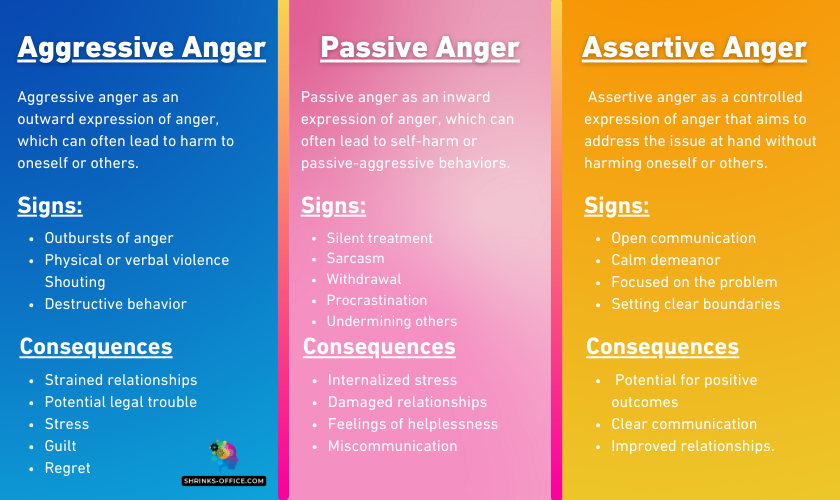How To Not Lose Your Temper According to Science
- Understand your emotional triggers in your quiet timeu003cbru003e- Don't take things personally u003cbru003e- Practice deep breathing for a few momentsu003cbru003e- Take a timeoutu003cbru003e- Focus on the solution, not the problem
It could be with a person, friend, co-worker, or in a room full of people. It's easy to burst into anger when upset about a matter. However, after a few moments, you begin to regret the actions you took out of frustration and start doing damage control. Keep in mind you're not alone. A lot of people struggle with their temperament. So, how do you maintain your temper and remain calm in uncomfortable situations?
We'll also discuss the various forms of rage people express today and the benefits of counseling.
Helpful tip
Remember, uncontrolled rage breeds regret. Know how anger damages relationships and learn to express feelings calmly for harmony's sake.
5 Effective Ways to Avoid Losing Your Temper According to Science
Understand your emotional triggers in your quiet time
Losing your temper is a normal part of life, but it doesn’t have to be an uncontrollable problem. Once you understand your emotional triggers, you become more intelligent to act instead of react. [1]
It can be helpful to keep track of your triggers in a journal or on your phone. Write down the situations that make you uncomfortable and then think through them.
- Is it something someone said?
- Is it a particular type of behavior?
- Is it being in a particular environment?
Once you know your triggers, you can start developing strategies for managing them. For example, if you know being around certain people tends to make you angry, you can take a break and walk away before your temper gets the best of you.
Helpful tip
Dive beneath the 'anger iceberg' to understand its roots. Explore unseen emotions causing anger to better manage reactions and foster peace.
Don't personalize
One of the main causes of feeling angry is taking things personally. This happens because of childhood trauma, poor self-esteem, or when we make assumptions about other people's motives and intentions. According to research, keeping calm and taking a step back to see the issue objectively will have a more positive outcome. Also, it's vital to reassess your relationship with someone if you realize they are actively attempting to hurt your feelings. [2]
Practice deep breathing for a few moments
Deep breathing is an incredibly effective way to relieve stress when you’re feeling overwhelmed. Not only does it slow your heart rate, it also provides a powerful mental refocus and can help you respond more thoughtfully in tense situations. [3]
When you start to feel that familiar wave of anger, try pausing for a moment and reflecting on your breathing. Taking slow breaths from your diaphragm can help release the tension and frustration building up in your body. It may not feel easy at first, but you will regain control of your emotions with some practice. [3]
Take a timeout for a few minutes
"Timeout!" Basketball players use it as a little break to unwind and rethink their next play. [4]
Taking a timeout allows you to gain control of your emotions before they get out of hand. Research shows that stepping away from the situation can help prevent negative outcomes. [5]
Depending on the situation, there are several different ways to take a timeout. If you're in a public place, moving to a private area can relax your nerves. Also, you could take a walk around the block or find a quiet time in nature to clear your head. Just five minutes of being away from the situation can be enough for you to regain composure.
Focus on the solution, not the problem
Focusing on the solution helps you stay calm and keep perspective. It helps you avoid getting sucked into a pointless argument.
Try to concentrate on the most practical and efficient approach to solving the current problem. This doesn’t mean ignoring or brushing the problem aside but instead focusing your energy and time on finding an appropriate solution.
Did you know?
Hitting yourself when angry can be harmful. Instead, practice mindfulness and calming techniques to cope with intense emotions healthily.

How Not to Lose Your Temper When Arguing With Your Wife
Arguments between spouses are inevitable, but losing your temper doesn't have to be. With the right approach and understanding, you can express your opinions and feelings without letting anger get the best of you. Here are some unique and creative strategies to keep calm when disagreements arise with your wife.
Understand Your Triggers
Firstly, recognizing what triggers your anger is vital. Is it when you feel unheard or dismissed? Perhaps it's when you feel disrespected or unappreciated. Recognizing these triggers can help you manage your reactions more effectively.
- Action Step: Keep a journal to note down situations that spark anger. Reflect on them to understand the underlying reasons. This practice will make you more self-aware and help you devise better-coping strategies.
2. Practice Empathy and Active Listening
Try to understand your wife's perspective during disagreements. Empathy can help defuse your anger and make your spouse feel heard and understood.
- Action Step: Practice active listening. This means fully focusing on your wife when she speaks, reflecting her words, and asking clarifying questions.
Use 'I' Statements
Communicating your feelings using 'I' statements can help prevent defensiveness and promote understanding. For example, instead of saying, "You never listen to me," try saying, "I feel ignored when I share my thoughts, and it upsets me."
- Action Step: Make a conscious effort to start your sentences with 'I' during disagreements. This approach ensures that you're expressing your feelings without accusing or blaming.
Take a Time-out
If you feel your anger escalating, it's okay to take a time-out. This break can give both you and your wife time to cool down and gather your thoughts.
- Action Step: Establish a safe word or phrase that signals a need for a break. For instance, you might say, "I need a moment to cool down," and then take a walk or retreat to a different room.
Seek Professional Help
If your anger continues to be an issue despite your efforts, it may be worth seeking professional help. A qualified therapist can provide tools and techniques to help you manage your anger more effectively.
- Action Step: Reach out to a professional counselor or therapist if needed. Online therapy can be a great option if you prefer a more flexible and private setting. [7]

How Not to Lose Your Temper With Your Children
Parenting can be a challenging journey, filled with moments that test your patience. But it's essential to remember that your reactions can greatly impact your children. Here are some creative and practical strategies to help you maintain your cool even in the most trying situations with your kids.
1. Connect Before Correcting
Before you correct your child's behavior, make an effort to connect with them. Understanding their perspective can help you respond more empathetically.
- Action Step: Start by asking your child to share their thoughts or feelings about the situation. It could be as simple as, "Can you tell me why you did that?"
2. Make Use of Humor
Humor can be a great tool to diffuse tension. It can also help your child see the lighter side of things, making it easier to discuss the issue at hand.
- Action Step: Next time a challenging situation arises, try to lighten the mood with a joke or a funny remark. Remember, it's crucial to ensure the humor is not at the expense of your child's feelings.
3. Teach and Model Emotional Regulation
As a parent, you're the first role model your child has. By demonstrating how to manage emotions, you're teaching your child to do the same.
- Action Step: When you feel your temper flaring, express your feelings aloud, "I'm feeling really frustrated right now, so I'm going to take a few deep breaths to calm down." This verbalization not only helps you manage your emotions but also models healthy behavior for your child.
4. Set Clear Boundaries and Expectations
Children may act out when they're unsure of what's expected of them. Clear boundaries and expectations can help minimize these situations.
- Action Step: Clearly communicate your expectations to your child. For instance, you might say, "We don't throw toys in our house. If you're feeling angry, you can tell me or draw how you feel."
5. Practice Self-Care
Parenting can be draining, both physically and emotionally. Practicing self-care can help you remain calm and patient.
- Action Step: Incorporate regular self-care activities into your schedule. This could be anything from a quiet cup of coffee in the morning to a brisk walk in the evening. [8]

How Not to Lose Your Temper With a Sibling
Siblings often share a unique bond, but it can sometimes be punctuated by disagreements and conflicts. When emotions run high, it can be challenging to keep your cool. Here are some distinctive strategies to prevent losing your temper when interacting with your sibling.
1. Practice Mindful Communication
Effective communication can prevent many conflicts. Aim to express your thoughts clearly and listen actively to your sibling's perspective.
- Action Step: Try the 'pause and reflect' method. When your sibling says something that triggers you, pause for a moment before responding. Reflect on what they said and how you want to respond. This simple act can prevent reactive and heated exchanges.
2. Develop Emotional Intelligence
Understanding your own emotions and those of your sibling can help manage disagreements better. This is where emotional intelligence comes into play.
- Action Step: Next time you're in a conflict, try to identify and name your emotions. Are you really angry, or is it more frustration or disappointment? Also, try to understand what emotions your sibling might be experiencing.
3. Practice Forgiveness and Letting Go
Harboring grudges can often lead to explosive confrontations. Learning to forgive and let go of minor issues can lead to healthier interactions.
- Action Step: Try to adopt a mindset of forgiveness. If your sibling has upset you, talk about it, resolve it, and then let it go. Holding onto it will only fuel future arguments.
4. Set Personal Boundaries
Boundaries are essential for maintaining healthy relationships. They help to ensure respect between individuals and prevent resentment.
- Action Step: Identify areas where you need personal boundaries with your sibling. It could be related to your time, space, or possessions. Once identified, communicate these boundaries respectfully.
5. Seek Mediation If Needed
If conflicts with your sibling become too frequent or intense, seeking mediation can be helpful. This could be a trusted family member or a professional mediator.
- Action Step: If you feel that your disagreements with your sibling are getting out of hand, don't hesitate to seek help. Mediation can provide a neutral ground for both parties to express their feelings and find a resolution. [9]

What Are the 3 Types of Anger?
There are three distinct types of anger: Aggressive, Passive, and Assertive. [6]
- Aggressive anger is often expressed as explosive outbursts, either verbally or physically. This type of anger involves name-calling, yelling, and even physical violence.
- Passive anger is the opposite of aggressive anger. Instead of outwardly expressing anger, passive anger is often expressed more passively, such as by giving someone the silent treatment or engaging in other forms of subtle manipulation.
- Assertive anger is the most effective way to express and manage anger. It involves telling your feelings respectfully and clearly while being aware of the rights and feelings of others. Assertive anger involves talking and speaking out while still respecting the needs and wants of everyone involved. It's important to recognize which type of anger you tend to lean towards, as this will help you deal with your emotions.
Do You Need Therapy?
Consider counseling to acquire better coping strategies if you believe your anger is truly out of control, affecting your relationships and other significant aspects of your life. You can engage with a psychologist or qualified online therapist to develop various approaches for altering your thoughts and actions.
While you're there, ask about their approach to anger management when you first meet with them. Check to be sure this isn't just a strategy to "bring you in touch with your feelings and express them"—that may be the exact cause of your issue.
You can take this quick bipolar test to check if you have bipolar disorder.

Personal Stories of People Who've Learnt To Control Their Anger
Gary
Gary, a 33-year-old man, discovered the potential of hypnotherapy through a friend. Despite initial skepticism, he found himself at a point where he had tried everything else to manage his issues without success and decided to give it a shot. His past, marred by childhood bullying and a strict, temperamental father, had left deep emotional wounds. This, combined with physical abuse from an older stepbrother and his experiences as a professional fighter, had made Gary a very angry person.
Even though his stature and strength had grown, his emotional trauma led him to react violently when feeling intimidated or cornered. Multiple charges of assault and attempted murder had led him to therapy and anger management, but these interventions only partially helped, and he inevitably reverted to his old ways.
In a desperate attempt to regain control over his life, Gary contacted Sonya, a hypnotherapist, and arranged a session with her. The meeting with Sonya was an emotional one, and he left feeling exhausted, yet with a sense that something had changed. Sonya provided him with a recorded session to listen to daily, which gradually lifted his persistent feelings of aggression and anger. The change was noticeable to those around him, leading him to make further positive changes in his life.
He began surrounding himself with positive influences, cut ties with negative individuals, and saw improvements in his personal relationships. His transformation, which began with Sonya's session, led him to a place of genuine happiness and calm, much to the relief and joy of his loved ones.
Conclusion
Don't have unrealistic expectations. Learning how to control your emotions and stopping yourself from erupting like a volcano takes practice and patience. It can be helpful to understand what triggers your outbursts, so you can take steps to prevent them from happening in the first place.
Also, try looking into therapy - the benefits of therapy include better anger management, improved communication, and healthier relationships.
By following these tips, you can start to gain control over your temper and become more intelligent in your approach to arguments. With enough practice, you can learn how to argue without losing your temper and find better ways of resolving conflicts.
FAQ
Why do I keep losing my temper so easily?
The answer could be that it’s a combination of factors. It could be that you haven’t taken the time to understand your triggers for anger. Alternatively, it could be that you’re not taking steps to manage your emotions or that you’re relying on unhealthy coping mechanisms. It could also be that you’re unaware of the warning signs of an impending meltdown or don’t know how to manage your emotions effectively.
How do you argue without losing your temper?
Arguing without losing your temper is no easy feat, but it can be done. First, realize when you’re feeling heated and take a few moments to pause and collect yourself. Take some deep breaths and try to remember that the other person isn’t attacking you—they just have a different opinion or perspective. Once you’ve taken some time to cool down, focus on communicating your points in a logical, respectful way. Ask questions if you need clarification, and be mindful of how you phrase things—try to avoid inflammatory language or personal attacks.
References
- How to Identify and Manage Your Emotional Triggers
- How to Not Take Things Personally
- This Is Why Deep Breathing Makes You Feel so Chill
- Basketball Timeouts
- Resilient Individuals Use Positive Emotions to Bounce Back From Negative Emotional Experiences
- Dealing with Anger: Types of Anger
- psycom: When Anger Becomes Emotional Abuse: How to Control Anger and Frustration in a Relationship
- Child Welfare Information Gateway: Tips for Parents: Dealing With Temper Tantrums
- SAMHSA: ANGER MANAGEMENT
- SONYA HUDSON: Anger Management Success Story
